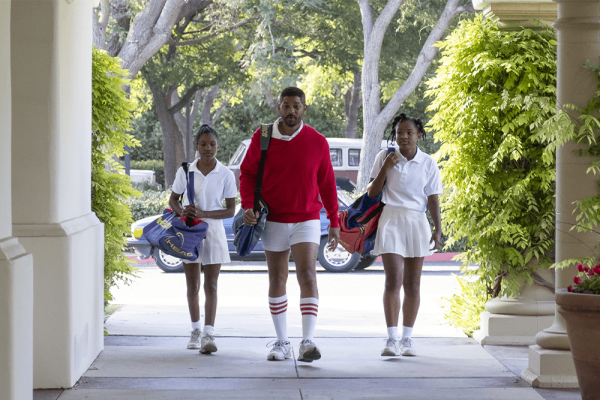My father became a tennis player as a young adult, well before I was born, in the interest of connecting with his then-girlfriend’s father. Although that relationship eventually ended, my dad’s love for tennis did not. He kept playing, practicing for hours every week, eventually winning amatuer tournaments and tennis ladders in Northern California.
In my own life, I was enthralled by my dad’s favorite tennis player, Andre Agassi, during his late-career renaissance in the early 2000s. In high school I read Agassi’s breathtaking autobiography, Open, which motivated me to join my high school tennis team. My dad would wake up around 6 a.m. every Saturday to practice tennis, and to soundly defeat me in our exhibition matches.
Tennis is still one of my heart’s great joys, as is talking with my father. And though I knew King Richard (Nov. 19) was marketed as a movie about Richard Williams (Will Smith) — the unorthodox father of tennis superstars Venus and Serena — the film’s focus on fatherhood still caught me off guard. Franky, I expected King Richard to be more about his daughters.
A film centered on the story of Venus (Saniyya Sidney) and Serena (Demi Singleton) would have been easy. Serena Williams is the greatest tennis player — maybe the greatest athlete — of all time, and Venus boasts a mighty career of her own. Their upbringing is made special by their on-court dominance and their relationship as sisters. While other films (like the 2012 documentary Venus and Serena) have told their stories before, beginning the biopic from when they were children must have been tempting.
Instead, the film opens when Venus and Serena are already near teenhood and tennis stardom. We don’t suffer through scenes of the two first learning to swing a racket, and this allows the movie to focus on the true challenge the sisters faced: the classism and racism of rich, white, tennis institutions that had little time for two Black girls from Compton, Calif. — an issue that has improved but still exists in U.S. tennis.
While King Richard is by no means a visual masterpiece, the cinematography allows tennis to look realistic — no small feat. Director Reinaldo Marcus Green told Sojourners it took “a lot of trial and error” to make the on-court scenes not only believable, but entertaining.
“I didn't want people to get lost in the semantics of the tennis matches,” Green said. “It was more about what was happening internally while [Venus] was out on the court … Tennis is not like any other sport … You're really out there on your own, isolated, and I wanted it to feel that way.”
The portrayals of Richard, Venus, and Serena take center stage, but coaches Paul Cohen (Tony Goldwyn) and Rick Macci (Jon Bernthal), as well as the girls’ mother, Oracene “Brandy” Williams (Aunjanue Ellis), are not relegated to the background.
Ellis particularly stands out as a strong supporting character. The scenes of Brandy Williams taking Serena for tennis lessons, and a later scene where Brandy confronts her husband, provide a non-narrative lens to view the main character through.
The casting and costuming are also praiseworthy. It’s a low bar to cast and costume characters appropriately, but when so many films make casting decisions that whitewash its subjects or exhibit Hollywoods’ common colorism, it’s refreshing to see Black actors play Black characters, with all the braids and beads as seen in real life.
As the film moves the sisters from unknown to grandstage it neither rushes nor lingers. The careful pace mimics the film’s protagonist, who is ever attentive to letting Venus and Serena be children, shielding them from burnout and the pressures of superstardom.
Most of the screenplay’s tension revolves around Richard’s attempts to balance pushing and protecting his family. Richard protects his daughters from young men in Compton who sexually objectify them, and from the sleazy executives who objectify them financially. Richard pushes his daughters to play better, to love each other, to respect adults, and to be themselves.
The film doesn’t explicitly ask viewers to consider their own fathers, but it serves as a natural invitation. Even Green couldn’t help but opine on his own father when we spoke before the film’s release. When I asked Green, a former baseball player, if he had an interest in tennis before signing onto the film, his answer (no) quickly turned to the similarities between his dad and Richard.
“[I grew] up with a father that literally never missed a game ... he was trying to raise major league baseball players, my brother and I, and I took it as far as two major league tryouts,” Green said. “The other thing I had was a father that also preached education. No matter what, we were going to have a fallback and we were going to be able to support ourselves.”
It’s Richard’s genuine commitment to his daughters as people first that stands out throughout the film, a commitment that Green said is even more visible as the Williams’ sisters come toward the ends of their careers.
“[Venus and Serna are] extremely well-rounded human beings,” Green said of the sisters, who also were executive producers of King Richard. “Their legacy will be far greater than being two of the greatest athletes of all time.”
At some points, viewers might wonder if Smith is portraying a caricature of Richard Williams more than the man himself. Richard is brash, unapologetic, and quirky in his confidence that his daughters will be great. The film shows him sending tapes to high profile coaches, interrupting the practice of tennis legends Pete Sampras and John McEnroe, and offering coaching tips opposite of the coach teaching Venus pro-bono. But the truth is that Richard Williams is unique. He is unique because he is the father of two of the greatest athletes the United States has ever known, but even more unique because he doesn’t force them toward destiny.
In Open, Andre Agassi writes about how his own father’s brutal tenacity and relentless pushing was the genesis for Andre Agassi’s hatred of tennis for most of his life, and the hope that his own kids would not play the sport.
Andre isn’t the only prodigy-turned-legend to have a complicated relationship with the sport and his parents; it stands out that Richard’s tendency is the opposite of so many sports parents. Where the fathers of Andre Agassi, Tiger Woods, and others are eager to see their children become stars, Richard is cautious.
Throughout the film, Richard is being pushed to allow his daughters the spotlight, the accolades, and the awards. He resists signing the first offer of endorsement, he pulls Venus out of junior tennis competition, he intervenes when journalists harass Venus, and he has no problem firing Venus’ coach when the two disagree.
While not all of Richard’s decisions are laudable, the tennis universe seems to be catching up to his caution nearly 30 years later. As Naomi Osaka and others lead a revolution in approaching mental health in sports, Richard’s overprotection seems closer to the right answer than the exploitation and lack of care historically shown toward athletes.
But he is nonetheless overprotective. The actors and script shine when other characters challenge Richard. All seem to challenge him out of a place of love: love for Venus and Serena, love for tennis, and even love for Richard. The man who has scripted his daughters’ lives has to put pride to the side and allow them agency. He is not a perfect father, even in film, but he is a good father.
The most disappointing part of the film comes just before credits roll, as the film first and foremost highlights the dollar amount on Venus’ first endorsement deal. Certainly it is a life-altering amount of money, and notable considering the racial wealth gap, but it feels a shallow crescendo for characters pursuing so much more than money.
But even odd endnotes don’t overshadow the sheer joy of King Richard. The film may not set out to affect tennis or parenting, but we can hope that it will.
Got something to say about what you're reading? We value your feedback!







